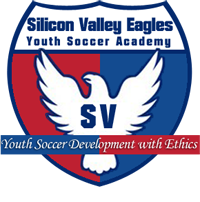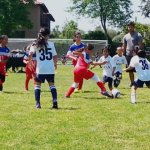Silicon Valley Eagles
The Silicon Valley Eagles Soccer Academy blog is a great source of soccer coaching tips, parents and players improvement tips and advises, and updates on the soccer world news.
Helpful Techniques Parents Can Build Mental Toughness
- Font size: Larger Smaller
- Hits: 3464
- Subscribe to this entry
- Bookmark
 Like it or not, sports come with pressure. There will come a time when your young athlete gets the ball with the clock winding down or steps up with the bases loaded. When that happens, mental toughness often determines whether or not they’ll succeed. Even though you can’t be on the field or the court with your young athlete during these situations, there’s plenty you can do to help beforehand. Here are five methods to get you started.
Like it or not, sports come with pressure. There will come a time when your young athlete gets the ball with the clock winding down or steps up with the bases loaded. When that happens, mental toughness often determines whether or not they’ll succeed. Even though you can’t be on the field or the court with your young athlete during these situations, there’s plenty you can do to help beforehand. Here are five methods to get you started.
1. Call Your Young Athlete a Competitor
“There goes our little winner” or “Here comes Johnny, our star goalie.” How do you introduce and describe your kid?
Be careful about using descriptors that emphasize only part of their identity. They are not always winners, and they certainly don’t always lose. A parent of an athlete I know once introduced her as “perfect little Sara.” That’s tough to live up to.
Your kids are only athletes some of the time. However, they can still compete in everything they do. They can compete in grades, paying attention and playing sports. Emphasize that competing means competing against yourself, not anyone else.
2. Love Your Partner
It’s easier for me to be a good parent than a good partner. I can love on my kids, but I also need to love with the help of my wife. With my wife, I have to listen, reflect, emphasize, budget, discipline, strategize and co-parent. It takes more work.
The most important relationships take place within the four walls of our home. How we interact, show affection and disagree with our spouse or partner models how our kids will see the outside world. And don’t forget: kids see everything. It matters how you act. Remember, you get to define what your children think is “normal” behavior. If they see aggression and resentment towards one another, they will approach others in the same way.
3. Think Ownership, NOT Buy-In
There’s a big difference between ownership and buy-in. Buy-in means that playing sports is someone else’s idea—usually yours. Ownership is more powerful because the desire to play comes from your kids. Doesn’t the best parenting take place when your kids think that they came up with the idea, anyway?
If competitors take ownership of their game, they will assume ownership within the team. Before each season, define your role and ask you kids what feedback they want from you. Allow them to pack their own bags, schedule their additional practices and use their free time. After the initial conversation, don’t intervene at anytime unless their safety or health is at risk.
4. Avoid Texting or Emailing
Sadly, we over-rely on texting to communicate. It is fine for simple notes and reminders, but never for complex issues, especially when feelings are involved. It’s not what you say, it’s what they hear.
Most coach-athlete and parent-athlete problems result from lack of communication. Too often, we text important messages to our kids instead of setting a up a time to talk.
Kids develop mental toughness by overcoming adversity. They need to be able to communicate effectively with their coaches and fellow players. However, if we don’t allow them to use their own voices, they won’t be able to speak up when needed.
5. Don’t Talk About Other Players, Coaches or Teams
Sports are about winning, but they’re also about losing and getting better. No one likes losing, but it isn’t fatal. We help build our kids’ mental toughness by allowing them to experience setbacks and deal with adversity.
Too often, though, we try to make it better. If we try to remove their ownership by blaming anyone else, we give an out, an excuse. If there’s an out, they will take it and learn to use it. Bad calls, bad plays and poor execution happen, but what lessons are we teaching when we say, “It wasn’t your fault, it was something else’s”? By that logic, when our kids play well and win, it must also be due to something else. We can’t have it both ways.







